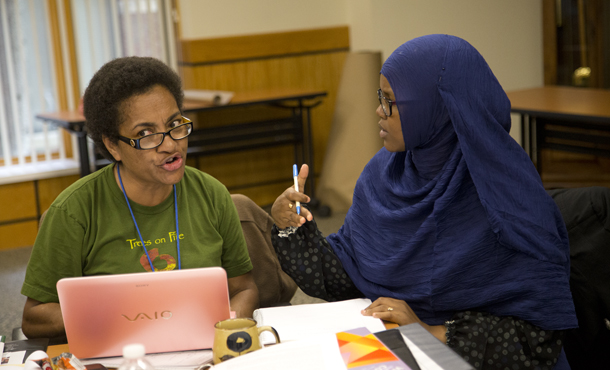Many of the 196 attendees at this year’s Summer Peacebuilding Institute (SPI) had survived devastating loss and trauma. Yet the final week of that gathering at Eastern Mennonite University began with an evening of infectious joy.
SPI learners – representing 43 nations over six weeks of sessions, May 6-June 14 – did line and contra dancing, joined an exuberant Syrian circle dance, clapped hands to a spirited maranga, watched a graceful performance by colorfully garbed South Pacific colleagues, and eased into a Virginia Reel.
“It’s a nourishment for my soul,” Lilian Burlando said of her near-annual trip to SPI, on the Harrisonburg, Va. campus, from Tierra del Fuego, Argentina. Burlando, who operates a counseling and interfaith dialogue center, said she felt uplifted by the course “Narrative, Theory and Practice,” which highlighted “the importance of stories in everyday life.”
By listening attentively to each other’s narratives, students “learn to be the experts” and not leave understanding to professionals, explained therapist Vanessa Jackson of Atlanta, who taught the narrative course with David Anderson Hooker.
Burlando smiled as she watched granddaughter Mercedes Echazu dance. Echazu – a recent social-work graduate and one of five grandchildren, plus a daughter, who have accompanied Burlando to various SPI sessions – completed “Monitoring and Evaluation,” a course relevant to her profession.
In Nigeria, after 15 years’ employment at a bank, Helen Kwuelum decided to work in peacebuilding and women’s empowerment. She attended SPI’s four sessions, joining husband Charles, who has completed a year’s study in the EMU Center for Justice and Peacebuilding master’s program.
Near their home in northern Nigeria, the couple had fled bombings by the militant Islamist Boko Haram movement. “So many people were killed, displaced, traumatized,” said Charles. Recent news, in turn, reports thousands of families fleeing the region following a government crackdown on Boko Haram, which recruits unemployed youth to fight.
Charles and a colleague hope to befriend young Nigerian Muslims through their organization, Transforming Systems Initiatives. Helen regrets that during the bombings, “I thought all Muslims taught violence.” Discovering “faith in peacebuilding” at SPI, she no longer attributes violence to any faith. Conflict, she said she now understands, “is all about ourselves, not about the religions.”
Clarinda Molia of the Solomon Islands sang “From a Distance” at the dance. When that ballad of peace became popular during the first Persian Gulf War, Molia was just a baby.
Ana-Latu Dickson of Papua New Guinea studied restorative justice at SPI. Although her nation’s courts employ the concept, Dickson – who helps rehabilitate perpetrators of violence against women – said, “I’m learning more about it here.” She and Molia were among 16 South Pacific and five East African participants in the Women’s Peacebuilding Leadership Program.
This year’s overseas SPI applicants encountered “visa problems – as usual,” co-director Bill Goldberg reported. Approval of applications from Pakistan, Afghanistan and Iran “took so long for ‘administrative processing’ that almost no one got a visa in time to come.”
In addition to the narratives course, new offerings were “Designing Peacebuilding Programs,” taught by Lisa Schirch, and “Nurturing Resilience,” by Bill Lowrey and Ali Petersen.
Bruce Stambaugh, a retired educator and weekly columnist for The Holmes Bargain Hunter in a heavily Amish region of Ohio, was one of only three North Americans of 16 participants in his class. On his blog, he wrote: “The others came from places like Azerbaijan, Thailand, Iraq, Kurdistan, Belgium, Ghana, Nigeria, Syria and Haiti….
“The students ranged from young adults to grandparents like me. … They were pastors, government leaders, workers for non-governmental aid agencies, interpreters and teachers.”
The worries of a Haitian classmate for his family’s safety at home helped Stambaugh appreciate both his own rural Ohio community and SPI classmates’ resilience.
”Instead of focusing on how bad it was in their country or blaming other governments, these men and women were glad for the opportunity to learn how to dissect and resolve conflict,” he wrote on his blog. “They would take what they had learned and apply it as best they could.
“Their goal was to improve the world around them, even if it was one person at a time. Where there was despair, they saw hope.”
